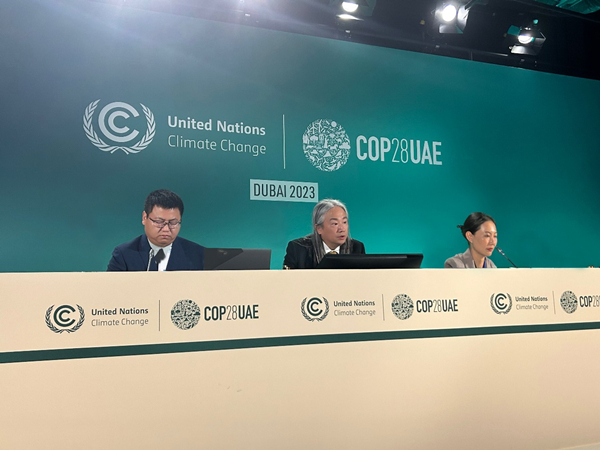Datong super energy complex makes its debut at COP28


Alex Ju (center), founder and CEO of Chinese infrastructure service provider BCI Group, delivers a speech at COP28 in Dubai, UAE, on Dec 3. [Photo provided to goshanxi.com.cn]
A super energy complex in Datong, North China's Shanxi province, made its debut at COP28 in Dubai, UAE, on Dec 3.
Alex Ju, founder and CEO of Chinese infrastructure service provider BCI Group and global advisor on cross-system energy transformation for the Climate Group, was invited to deliver a keynote speech, introducing the advantages of Datong's digital economy and energy transformation and showcasing China's energy-saving and carbon-reducing achievements in the infrastructure industry.
In recent years, Ju and his entrepreneurial team have been deeply rooted in Shanxi province, with a focus on the development of Datong.
"Datong, where the super energy complex project is located, has natural advantages in developing the computing industry chain, with its outstanding location, abundant resources, profound cultural heritage, and complete industrial system," said Ju.
"Datong also regards the digital economy as the core engine and essential lever for transformation and development, making great efforts to improve digital infrastructure, promote the rapid growth of digital core industries, and expand the scope of digital applications. Energy transformation and green revolution are well underway," he added.
The super energy complex project in Datong was introduced by Ju at the event. The complex includes large-scale wind and solar power bases, extended-range energy storage stations, water and thermal cycle networks, computing equipment research and manufacturing bases, and circular link tunnels.
It exchanges cold and thermal energy, storing cold energy on a large scale while generating huge amounts of thermal energy at the same time, in a bid to support China's efforts to achieve carbon neutrality.
Ju revealed that the project has already reserved 1 million square meters of industrial park space, manufacturing production lines, a 2,000-kilometer ring network connecting with the capital Beijing, and the ability to recycle and reuse large volumes of water as a natural cooling source.
In terms of energy, the project has completed the reserve of 2.1 gigawatts of green power resources, which can generate about 3 billion kWh of green electricity annually after full production. By 2030, the carbon neutrality goal will be achieved at these facilities, helping Datong become a world-class infrastructure industrial cluster.
Ju said he hopes to promote Datong's reputation in green and low-carbon development globally through COP28, and help the city continue on its path of energy conservation and carbon reduction for green and sustainable development.







